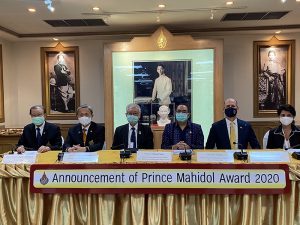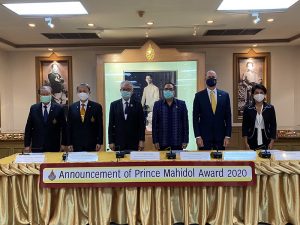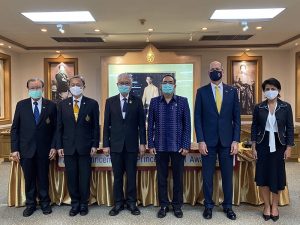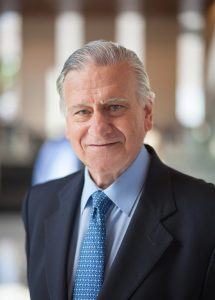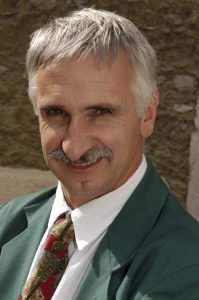On 12 November 2020, Professor Dr.Prasit Watanapa, M.D., Ph.D. Dean of the Faculty of Medicine, Siriraj Hospital, Mahidol University, in the capacity of Vice President of the Prince Mahidol Award Foundation, Mr.Tanee Sangrat, Director-General of the Department of Information, Ministry of Foreign Affairs of the Kingdom of Thailand, in the capacity of the Chairman of the Sub-Committee on Public Relations of the Prince Mahidol Award Foundation, and Professor Vicharn Panich, M.D. Chairman of the International Award Committee of the Prince Mahidol Award Foundation, held a joint press conference to announce the 29th Prince Mahidol Award for 2020 at the Prince Mahidol Memorial Room, 2nd Floor, Syamindra Building, Siriraj Hospital.
This year, the Prince Mahidol Award in the field of Medicine is awarded to
Valentin Fuster, M.D., Ph.D.
The Prince Mahidol Award in the field of Public Health is awarded to
Bernard Pécoul, M.D., MPH.
There were 44 nominations from 18 countries. The Scientific Advisory Committee screened all candidates from the year 2018 – 2020 and subsequently submitted a short list of candidates to the International Award Committee who made a recommendation to the Board of Trustees. H.R.H. Princess Maha Chakri Sirindhorn presided over the meeting of the Board of Trustees held on 20 October 2020 during which the final decision on the Prince Mahidol Award 2020 was made.
In the past 28 years, the Prince Mahidol Award has been conferred to 85 individuals, groups of individuals, and institutions. Among them, 4 were Award recipients of Thai nationality, namely (1) Professor Dr. Prasong Tuchinda (2) Dr. Suchitra Nimmannitya who received the Prince Mahidol Award in the field of Medicine in 1996, and (3) Dr. Wiwat Rojanapithayakorn and (4) Mr. Mechai Viravaidya who received the Prince Mahidol Award in the field of Public Health in 2009.
Among the Awardees of the Prince Mahidol Award, 5 subsequently received the Nobel Prize:
(1) Professor Barry J. Marshall from Australia was conferred the Prince Mahidol Award in the field of Public Health in 2001 for the discovery of the new bacterium identified as Helicobacter pylori that caused severe gastritis and its sensitivity to particular antibacterial drugs. He received the Nobel Prize in the field of Medicine in 2005 for the same discovery.
(2) Professor Harald zur Hausen from Germany was conferred the Prince Mahidol Award in the field of Medicine in 2005 for the discovery of the human papilloma virus HPV16 and HPV18 from the cancer tissue and elucidated how the viruses turn normal cells into cancer cells. He received the Nobel Prize in the field of Medicine in 2008 for the same discovery.
(3) Professor Dr. Satoshi Omura was conferred the Prince Mahidol Award in
the field of Medicine in 1997. He is known for the discovery and development of various pharmaceuticals originally occurring in microorganisms. His research group isolated a strain of Streptomyces Avermitilis that produce the anti-parasitical compound avermectin which contributed to the development of the drug ivermectin that is currently used against river blindness, lymphatic filariasis, and other parasitic infections. He received the Nobel Prize in the field of Medicine in 2015 for the same discovery.
(4) Professor Tu You You, a member of the China Cooperative Research Group on Qinghaosu and its Derivatives as Antimalarials, was conferred the Prince Mahidol Award in the field of Medicine in 2003 in an organisational category for the discovery of Qinghaosu as a new drug for treatment of the P.falciparum malaria. She received the Nobel Prize in the field of Medicine in 2015 for the same discovery.
(5) Sir Gregory Paul Winter was conferred the Prince Mahidol Award in the field of Medicine in 2016. He was a pioneer in the field of antibody engineering and modification technology. He invented techniques to humanise antibodies for therapeutic uses, which later led to the creation of cutting-edge therapeutic drugs. He received the Nobel Prize in the field of Chemistry in 2018 for the same discovery.
The Prince Mahidol Award Foundation under the Royal Patronage was established in commemoration of the centenary of the birth of His Royal Highness Prince Mahidol of Songkla 1 January 1992. The Foundation is under the Royal Patronage, with Her Royal Highness Princess Maha Chakri Sirindhorn as President. The Foundation annually confers two Prince Mahidol Awards upon individual(s) or institution(s), who have demonstrated outstanding and exemplary contributions to the advancement of the world’s medical and public health services. Each Award consists of a medal, a certificate, and a prize to the sum of US $100,000.
*******
Prince Mahidol Award Laureate 2020
In the Field of Medicine
Valentin Fuster, M.D., Ph.D.
Director, Mount Sinai Heart and Physician-in-Chief of The Mount Sinai Hospital, New York , USA
General Director of the National Center for Cardiovascular Research (CNIC), Madrid, Spain
Editor-in-Chief of the Journal of the American College of Cardiology
The United States of America
Professor Dr. Valentin Fuster received his Doctor of Medicine from University
of Barcelona, Spain, and Doctor of Philosophy from the University of Edinburgh,
the United Kingdom.
Ever since 1970, Professor Fuster has persevered in studying the roles of platelets that account for coronary artery occlusion and the benefit of antiplatelet drugs in preventing the occlusion of the bypassed vessels after coronary artery bypass graft (CABG) operation. The experiment was initiated in laboratory animals before subsequent definitive trial in humans. He was the first authority who demonstrated the effectiveness of antiplatelet agent in the prevention of the occlusion of the bypassed vessels after bypass operation. The explicit knowledge from his studies leads to the development of drug-eluting coronary stent that has been widely used to treat the patients with myocardial infarction requiring the dilation of coronary artery by balloon angioplasty and stent placement. Professor Fuster’s research works not only have saved many lives of coronary artery disease patients but also preferably refine the management of this disease nowadays.
The achievement of Professor Dr.Valentin Fuster is the result of bridging and magnifying the basic research knowledge into the novel insights that are beneficial to many patients especially the introduction of antiplatelet therapy. His exceptional works have saved millions of lives around the world.
******
Prince Mahidol Award Laureate 2020
In the field of Public Health
Bernard Pécoul, M.D., MPH.
Founder and Executive Director,
Drugs for Neglected Diseases initiative, (DNDi)
The French Republic
Dr.Bernard Pécoul received his Doctor of Medicine from the University of Clermont-Ferrand, France, and his Master of Public Health from Tulane University in the United States.
Prior to engagement with the Drugs for Neglected Diseases initiative (DNDi), Dr.Pécoul was the Executive Director for Médecins Sans Frontières, an international humanitarian and non-governmental organisation engaged in overcoming barriers to access to essential medicines across Africa, Latin America, and Asia.
While working in Uganda, Dr.Pécoul found out that the usage of Melarsoprol, an organoarsenic compound used for treating human African trypanosomiasis (HAT) or Sleeping Sickness, had caused the death of 1 in 20 cases. The lacking of efficient drug and debilitating side-effects of existing medications inspired Dr.Pécoul to initiate the Drugs for Neglected Disease initiative (DNDi) in 2003 with the aim to deliver safe, effective, and accessible life-saving treatments for people with neglected diseases.
Under the lead by Dr.Pécoul, the DNDi has scaled up to an international, not-for-profit research and development organization that has attracted a diverse range of alliances from public and private sectors, e.g., Bill& Melinda Gates Foundation, Wellcome Trust, cooperations in Europe and many drug companies. To date, DNDi delivers eight effective treatments for neglected diseases, including malaria, sleeping sickness, visceral leishmaniasis, and Chagas disease. As a result, The World Health Organization has recommended these medications as the first line treatment for neglected tropical diseases in many countries. Recently, DNDi has been developing with more than 20 new chemical remedies and conducting more than 20 ongoing clinical trials.
As the Executive Director, Dr.Pécoul has collaborated with researchers, scientists and developmental affiliations to initiate and manage many research projects across the globe, especially in Africa and Latin America. DNDi aims to deliver 16 novel effective treatments (from the total of 18) for the patients of neglected diseases by 2023. Until now, DNDi has delivered eight new treatments to save countless numbers of neglect patients’ life.
Dr.Pécoul’s contribution plays a vital role in reducing the death rate and also improve the quality of life of millions of people worldwide, especially the neglected patients in developing countries and low-income countries.

